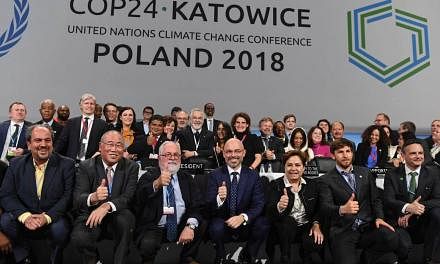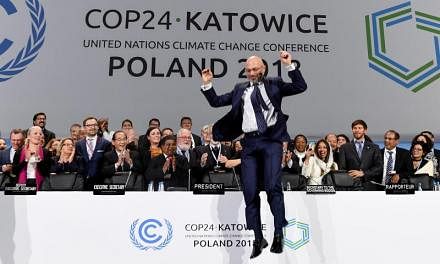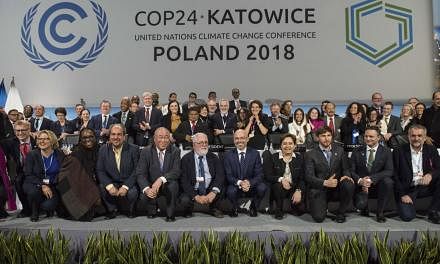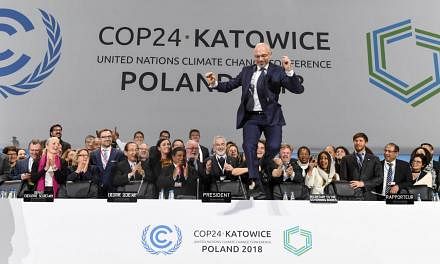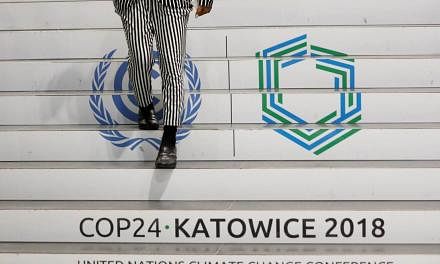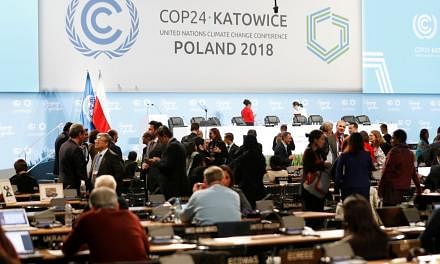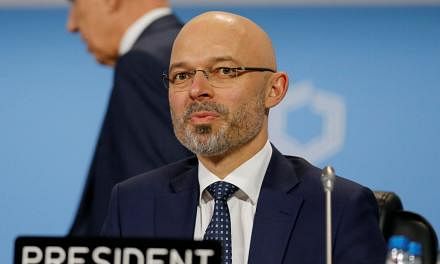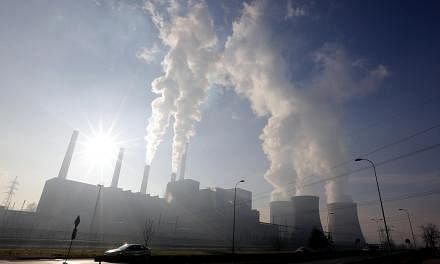KATOWICE, Poland - The fashion industry has long been associated with large amounts of waste and high emissions, but it seems that going green is now in vogue for some in this sector.
Forty-three companies - including brands such as adidas and Burberry, retailers such as Target, and supplier organisations - on Monday (Dec 10) pledged to find ways to reduce emissions in their value chains as part of the Fashion Industry Charter for Climate Action that was launched during the ongoing United Nations (UN) climate change talks in Katowice, Poland.
The fashion industry encompasses textiles, clothing, leather and footwear industries, from the production of raw materials and manufacturing of garments and accessories to their distribution and consumption. The industry has long supply chains and energy-intensive production.
The ever-changing cycles of fashion, disposable nature of clothes and accessories, and resource-intensive methods of production, have made textile production one of the most polluting industries, producing 1.2 billion tonnes of CO2-equivalent emissions every year - more emissions than international flights and maritime shipping, according to a 2018 paper in the scientific journal Nature.
The charter, an initiative of UN Climate Change, aims to change that by setting a target for the fashion industry to achieve net zero emissions by 2050.
The charter outlines certain ways of doing so, including decarbonising the production phase, selecting climate-friendly and sustainable materials, and using low-carbon transport options, among others.
While steps for implementation of these strategies have not been fully worked out, UN Climate Change said in a statement on Monday that the 43 signatories are not adopting a wait-and-see attitude but have already set an initial target to reduce their aggregate greenhouse gas emissions by 30 per cent by 2030.
Concrete measures have also been identified, including the phasing out of coal-fired boilers or other sources of coal-fired heat, and power generation in their own companies and direct suppliers from 2025.
Other signatories include familiar brands such as Esprit, Guess, Gap Inc, Hugo Boss and the H&M Group, as well as other organisations involved in the supply chain, such as textile associations and logistics companies.
UN Climate Change executive secretary Patricia Espinosa congratulated the signatories, saying: "The fashion industry is always two steps ahead when it comes to defining world culture, so I am pleased to see it now also leading the way in terms of climate action.
"The Charter, like the renowned fashion runways of the world, sets an example that I hope others will follow."
The charter is open for other companies and organisations to join, UN Climate Change said.
Chief executive of the H&M Group, Mr Karl-Johan Persson, said signing it was part of the company's ambition to become "climate positive" in its value chain. He added: "This charter is about getting the fashion industry united in important climate work. Our industry has a global reach and only together can we create the change that is urgently needed."
Designer Stella McCartney, another signatory, called on other retailers and suppliers to sign up as well.
She added: "Climate change is undoubtedly one of, if not, the biggest challenge of our lifetime. It is and will affect everyone on this planet and our future. I want to call on my peers in the business, from other brands to retailers and suppliers, to sign up to this charter now and take the necessary actions to address the reality of the issue of climate change in their business and value chains. Collectively we have a voice and the capacity to make a difference."
International environmental organisation Stand.earth said the new initiative was a symbolic first step for fashion brands who have yet to make climate commitments. However, it was imperative that brands go beyond the baseline actions outlined in the charter, and avoid measures that do not involve emissions reductions in the entire supply chain, or create other environmental problems.
Stand.earth climate campaigner Kristina Flores said the target of a 30 per cent reduction in greenhouse gas emissions by 2030 is unambitious, while the pledge to stop installing new sources of coal-fired heat or power plants ignores the climate pollution impacts from ongoing coal-fired operations. "Brands absolutely must go beyond the charter's baseline standard for emissions reductions in order to adequately address the scale of the climate change challenge at hand," she added.


